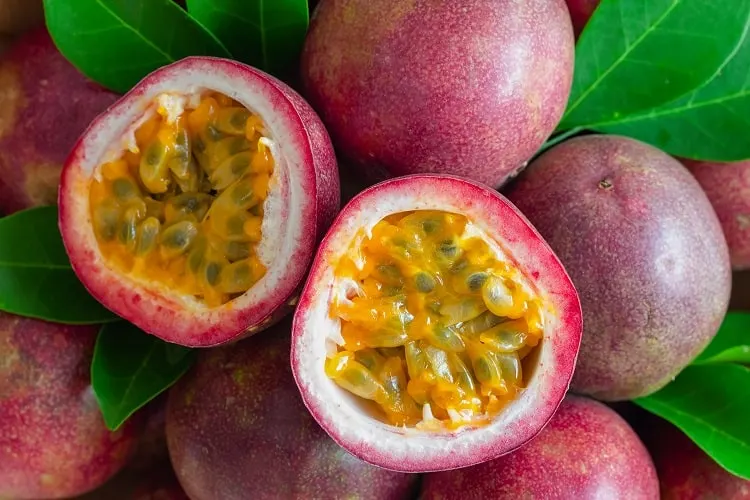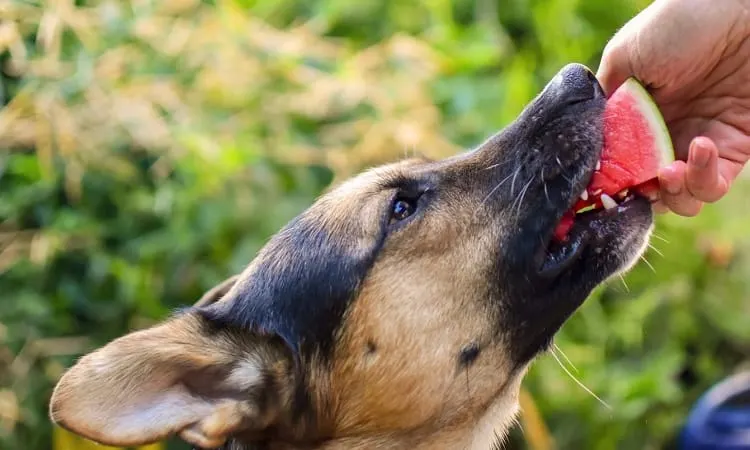Can Dogs Eat Passion Fruit?
Responsible pet owners are wary of what their pets put in their mouths.
Dogs are notorious for eating pretty much anything, so it’s only natural that you familiarize yourself with what is safe for your furry friend to eat and what’s not.
Today, we will talk about passion fruit and whether it’s right (or wrong) for your dog to eat it.
You will also learn about the health benefits of the fruit and what to do if your dog happens to have some.
What is Passion Fruit, and Where Does it Come From

Passion fruit is a type of exotic fruit native to South America. It gets its name because it is often used in passion potions and elixirs.
Passion fruit is round or oval and has a rough, leathery skin. The fruit’s flesh is full of seeds and has a tart, juicy flavor.
Passion fruit is a good source of Vitamin A.
It also contains fiber, potassium, and calcium. In addition to being eaten fresh, passion fruit can also be used in jams, jellies, and sauces.
It is also a popular flavor for ice cream, yogurt, and soda.
While passion fruit is not commonly found in grocery stores in the United States, it can be purchased at farmers’ markets or specialty food stores.
Health Benefits of Eating Passion Fruit

As mentioned, passion fruit is rich in vitamins C and A, as well as fiber and antioxidants. Furthermore, it contains high levels of enzymes that can help digest food and break down fat.
Consumption of passion fruit can help boost the immune system, improve digestion, and promote weight loss.
In addition, it is an excellent source of energy and can help improve mental alertness. Ultimately, eating passion fruit is a perfect way to improve overall health and well-being.
Can I Give Passion Fruit to My Dog

The short answer is no. Although passion fruit is delicious and often used in desserts, juices, and cocktails, it is not safe for canines to eat.
The main reason you shouldn’t feed your dog passion fruit is that it contains cyanogenic glycosides.
These compounds release cyanide, which is highly toxic to dogs (and humans) when metabolized.
Symptoms of cyanide poisoning include weakness, vomiting, difficulty breathing, and collapse.
While there is no cure for cyanide poisoning, early diagnosis and treatment can improve the chances of a full recovery. Call your vet for further consultation on what to do next.
Last but not least, passion fruit contains a lot of sugar, so it’s a massive risk if your dog is diabetic.
What to do if My Dog Eats a Passion Fruit

If your dog has eaten a passionfruit, the first thing to do is call your vet. While passion fruit is not poisonous to dogs, it can cause an upset stomach. Overeating on many other fruits causes the same issues such as apricots.
Symptoms of an upset stomach include vomiting, diarrhea, loss of appetite, and abdominal pain.
These symptoms can be uncomfortable for your dog, so it’s essential to seek veterinary care the moment you notice them.
Your vet may recommend giving your dog a bland diet or over-the-counter medication to help relieve the symptoms.
If your dog displays more severe symptoms, such as difficulty breathing or collapse, put it in the car and immediately drive to your nearest vet.
Call ahead so that they can be prepared for your dog’s arrival and start treatment right from the door.
Ultimately, passion fruit is not a massive health hazard for dogs, but be extra cautious and avoid it as much as possible.
How to Prevent my Dog From Eating Passion Fruit

The best way to prevent your dog from eating passion fruit is to keep them out of reach.
If you have passion fruit trees in your yard, make sure that they are fenced off so your dog can’t get to them.
Be mindful of leaving passion fruit lying around the house where your dog could easily find and eat them.
If you’re feeding your dog table scraps, make sure there’s no trace of passion fruit on the plate.
Other Exotic Fruits Not Recommended for Dogs

In addition to passion fruit, there are several other exotic fruits you should avoid feeding your canine with. To name a few:
- Pomegranate: Pomegranate has a lot of tiny seeds. If your dog eats too many of them, they can block your intestines. Mash the pulp if you still want your furry friend to try one.
- Jackfruit: The rind and seeds of jackfruit are hard to digest and can contain cyanide.
- Kumquat: When consumed in excess, the kumquat’s skin can cause stomach irritation. It also has an adverse effect on the liver. However, if you truly want to offer it to your dog, the peel must be removed.
Conclusion
It’s safe to conclude that passion fruit is not good for your dog. As mentioned before, it contains cyanogenic glycosides, which release cyanide when metabolized.
Cyanide is highly toxic to dogs and can cause vomiting, weakness, and difficulty breathing.
So, while passion fruit may be a tasty treat for humans, it is best to keep it away from your furry friend.
Resources:






























